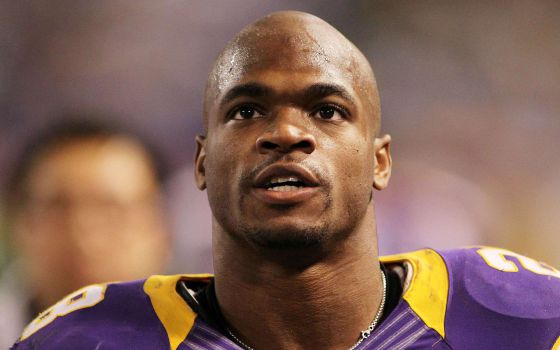
Adrian Peterson is the second player in the NFL to be excluded from their team in the last two weeks. Ray Rice was suspended indefinitely for assaulting his wife. Peterson’s career, brilliant until now, has taken a shocking turn due to the injuries he caused to his four-year-old son by striking him with a switch. The American National Football League, incapable of managing such a crisis in the public eye, is sinking in a scandal that is forcing the U.S. to face up to some of its family, sporting and cultural values.
In both cases, the public reaction, media coverage, and constant confrontation of panelists, columnists and experts on every aspect of the story have almost forced the NFL to take action. If the video of Rice holding his unconscious wife after hitting her in an elevator influenced the debate on whether he should be suspended for more than two games, the Peterson case offers photographs of the bare and damaged skin of his son, with marks on his legs, buttocks, testicles and hands — a sign that he tried to defend himself against his 1.82 meter tall, 98 kg father.
Both images have shown the U.S. an uncomfortable reflection. Should fans boycott the NFL? Should the NFL be stricter than the authorities have been? Why were neither of the two arrested? Why were neither suspended from their team, even after having admitted responsibility months ago? Should a father hit his children? Why is the country scandalized by Peterson’s actions when no state prohibits corporal punishment of minors — with rare exceptions — within the home?
“I’m from the South. Whipping — we do that all the time. Every black parent in the South is going to be in jail under those circumstances.” But I think we have to really be careful trying to teach other parents how to discipline their kids. Such was the defense of ex-NBA player Charles Barkley, born in Alabama and skeptical of the reaction caused by the Peterson case. Barkley recognized that he had been whipped and that the important thing is not to differentiate between right and wrong, but to understand that “we all grow up in different environments.”
This, too, was Peterson’s defense; he has been suspended from his team after playing this weekend despite the police having issued a warrant for his arrest. The difference between his words and those of someone outraged by the treatment of his son speaks volumes of the chasm between two worlds demonstrated by this crisis.
The police report, published by CBS, shows that Peterson admitted having hit his son “between 10 and 15 times,” and that he did it for his own good. “I never imagined being in a position where the world is judging my parenting skills or calling me a child abuser,” he stated in a report. “My goal is always to teach my son right from wrong and that’s what I tried to do that day.”
The Peterson and Rice cases appeared barely two weeks after the NFL introduced new measures against domestic violence, a six-game ban for assault and indefinite suspension for any re-offense. Rice’s suspension — appealed by the player — is, in reality, an exception.
On Monday, the owners of the Vikings, the team Peterson has played for since 2007, defended playing Peterson while the authorities were investigating the attack on his child. By Wednesday morning, they had changed their mind. They described the case as “serious” and assured that they wanted to “get this right” in dealing with a trial on “how a father raises his son.”
Main advertisers have not delayed their reactions. Beer company Anheuser-Busch “is not yet satisfied” with the way the authorities of the biggest sporting industry in the U.S. — worth around $10 billion a year — have handled the situation. Nike has suspended its endorsement deal with Peterson, Radisson Hotels have broken ties with the Vikings, and make-up company CoverGirl has reconsidered its sponsorship in the name of the 90 million female NFL fans.
Advertisers fleeing the NFL is but the first reason why companies, players and fans are facing a debate that is more far-reaching than the space between one scandal and the next. New York Times analyst Michael Powell has compared American football to the Roman Coliseum. Former secretary of state Condoleezza Rice, a possible replacement for the president of the NFL, has equated the management of the sport with military strategy. There are many who see soldier formations on the coach’s board. The spirit of the team, individual sacrifice for the group; there are too many similarities with the language of war — even though it is a sport.
“We coexist in two cultural moments at once,” wrote Powell. “After years of more or less covering our ears at talk of the broken bodies and minds of football players and the toll taken on their spouses, we now argue about knockout punches and beaten wives and work ourselves into a righteous frenzy from Monday to Saturday.”

Leave a Reply
You must be logged in to post a comment.